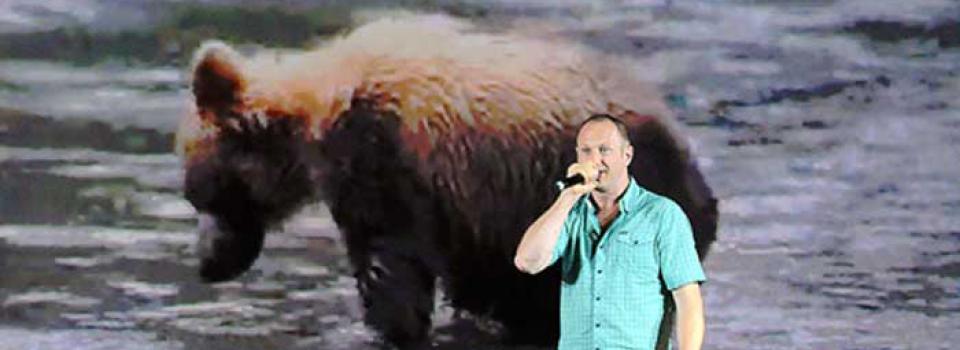‘Never think of yourself as separate from nature’ - Interview with Baba Brinkman
Thursday 13 November 2014
Our roving web editor Heath Synnott managed to catch up with rap artist and environmental communicator Baba Brinkman to talk about how protected areas have influenced his music and his life, and find out what nature means to him.
H: You performed some of your songs off your new album, ‘Rap Guide to Wilderness’. How have your experiences with nature or protected areas influenced your music?
B: I guess I can just go back there in my mind. I spent a lot of time outdoors, I planted trees for 12 years. And living in a tent and spending your time in the wilderness every day for several months a year, it just means that wilderness is not an abstraction for me. It wasn’t a guided national park tour, it wasn’t in a safe and managed context that I first encountered it – it was just out there! Seeing bears and seeing wolves and seeing moose on the side of the road as you drive to work, and just appreciating that its existence is independent of us, that’s the definition of what wilderness is. It’s not managed, not controlled, not stewarded, but given the space to thrive on its own, and there’s something that breeds a real humility and appreciation about seeing that wilderness doesn’t need us, that it gets by just fine. I think a lot of the problems of the world have ego-centrism as their root cause, and engaging with wilderness like that makes ego-centrism very difficult – because you’re just another organism out there with the same concerns as all the rest!
H: One of the other things you’ve rapped about is climate change, which we’re already seeing impacting on protected areas, and is one of the big issues that everyone here faces as managers of protected areas. What more do you think we could be doing to tackle this issue head on?
B: Well, I’m not an expert on climate change, but my appraisal is that consumer-level response is not going to be even close to enough. So, as individuals, the main thing people can do is engage fellow citizens and identify politicians that are clear about the issues and ready to face them. I think there’s a comforting fallacy that what you choose to buy at the grocery store or the department store is going to be enough of an action on climate change – but it’s really not. It needs international-level and institutional-level solutions, and that can only be achieved democratically. So, I try not to ever tell people in a rap that they should just choose the right kind of light bulbs, because I think that’s going to send us down the wrong path. But I think this conference is very on board with that message. It’s political action that people have in their sights, and as the recent accord with America and China showed, some politicians are listening. So hopefully we can just make more listen!
H: Definitely. One of the other science topics you’ve rapped about was your ‘Rap Guide to Evolution’. What gave you that idea, and what made you focus particularly on evolution?
B: Well, there was a biologist who challenged me to do it. It was the Darwin Bicentennial five years ago - 2009 was Charles Darwin’s 200th birthday - and a biologist in England, Mark Pallen, was organising a sort of Darwin conference… and he hired me as the entertainment! So he asked me to write some evolution-themed rap songs, and I just thought it was a fascinating subject and really tackled it with a lot of passion, and it changed the whole course of my career and what I do – I became known as a science communicator, for the raps, which was an unexpected and welcome development.
H: It’s one of the biggest challenges – there are so many people here with so much knowledge, but actually getting that across to people who don’t have that knowledge is really difficult. One of our key themes at this conference is about inspiring a new generation, and trying to connect with youth and that next generation who will be the leaders in protected areas management in the future. How do you think your music helps with that?
B: Well, I think rap music has been the voice of the youth since I was a youth - I’m 36 but I got into rap when I was about 11, and it’s one of those rare musical genres that seems to be surviving decades of change, it’s still the favourite music of young people, and it was 25 years ago, and that’s pretty unusual. By doing it in rap, I find ways to connect wilderness with existing interests and passions, and that creates a sense of relevance for young people. And also there’s something universal about a rhyme and a melody, and something that gets caught in your head. And if I can create something that gets caught in your head and has a wilderness message, then that helps it to penetrate your brain at a deeper level, and hopefully plant a seed.
H: I definitely think so. One last question – if you had one take-home message about protected areas, not just for people here but for anyone listening, the whole world, what would that one message be?
B: I think my one message would be [to] never think of yourself as separate from nature. We were produced by it, our origins lie in it, evolution is clear about that, we’re just another species. We’re one [species] with a privileged ability to predict the future or manipulate our environments, but that doesn’t mean that we fly free from nature. Protecting it is really a self-preservation strategy, as well as an ecosystem-preservation strategy. So connect with it and you’ll know why you should preserve it!







